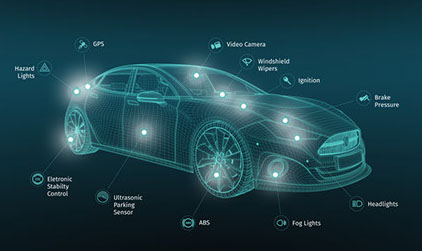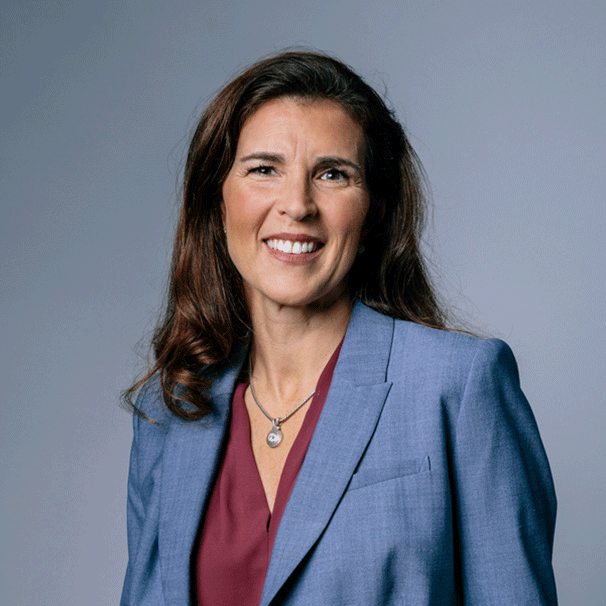

Here and There
Can you image living in a world that’s safer, smarter and more efficient? Where road accidents, heavy traffic and carbon emissions don’t take a toll on our daily lives?
Angel Mendez did, and went to work at HERE Technologies, a company that creates autonomous solutions for these and other modern problems through mapping and location technology. After a hi-flying career in Silicon Valley at companies like Cisco Systems that spanned thirty years, Mendez became the company’s Executive Vice President and Chief Operating Officer.
Mendez was born in Cuba, but politics tore his family apart. Mendez’ parents opposed Castro and fled to the U.S., while other family members remained behind. When Mendez was five, they made Puerto Rico their home, and he lived there until moving away for college. Mendez embraces his Puerto Rican upbringing and considers himself to be “Cuban-Rican.” Growing up bilingually gave Mendez a head start to an outstanding career. “Speaking multiple languages has been very helpful for me,” he admits.
there until moving away for college. Mendez embraces his Puerto Rican upbringing and considers himself to be “Cuban-Rican.” Growing up bilingually gave Mendez a head start to an outstanding career. “Speaking multiple languages has been very helpful for me,” he admits.
From a young age, Mendez felt a great interest in math. “I always wanted to be an engineer. I can’t really explain it, but it’s one of those things that started early,” he recalls. He received an electrical engineering degree from Lafayette College, and an MBA from Rollins College. Beginning his professional journey at GE, he went on to serve in senior positions at AlliedSignal, Citigroup, Gateway and Palm. At Cisco Systems he was SVP-Cisco Transformation, leading the Accelerated Cisco Transformation Program, a multi-year effort that helped redirect Cisco’s business model. These jobs gave Mendez the opportunity to work in Latin America, Europe, and Asia, which would prove helpful at HERE. Though based in Chicago, he is often on his way to HERE offices in places like Amsterdam, Mumbai, Singapore and Silicon Valley.
As a successful Latino professional, Mendez feels a great responsibility to give back. He serves on the board of directors of Kinaxis, and is an officer of the board of directors of the Association of Governing Boards of Universities and Colleges, as well as the Lafayette College Board of Trustees. “The higher education system is probably one of our country’s most significant competitive advantages. To me there’s nothing more important than supporting and growing the system that is so critical to opening opportunities toa wide spectrum of people and incomes,” says Mendez.
Like education, technology plays a big role in the advancement of society, he affirms: “Technology has changed people’s lives. It is fundamental to the way we live, learn, work. Pretty much all of our lives as humans is resting in some form of technology these days.” According to Mendez, business is no different. “You translate that to the corporate environment and pretty much every company is a technology company, no matter who you are. Those companies that are not centering their transformations and strategy at large on technology fall behind very quickly and can disappear much faster than ever before,” he says.
The allure of joining HERE proved irresistible. “The importance of location intelligence to many aspects of business and life at large is growing dramatically and HERE was by far the leader in that space,” says Mendez. In 2016, HERE had been spun out of Nokia and sold to investors that include Daimler, VW, BMW and Intel, and it was just like the launch of a new company, which provided an exciting opportunity. “I thought the challenge of that transformation from a business perspective and a management perspective was very attractive,” he says.
Another factor that compelled Mendez to join HERE was the ability to lead a company that will revolutionize the future. “The technology transition that’s going on, with the autonomous world, mobility on demand and driverless cars, HERE Technologies takes a crucial role in it,” Mendez expresses. He is responsible for running the core map making business, managing operations, and overseeing the transformation of the company. Mendez sees great things happening in the future at HERE, since autonomous technology will revolutionize the way we live and do business. Some things Mendez says we can expect to see with the use of autonomous technology are greater road safety, decreased traffic and increased mobility options for society at large. “It will take longer than people think, but it will be more profound,” he concludes.
By Stephanie Sanyour
HERE Technologies is an international company founded in 1985 with more than nine thousand employees worldwide, recognized for creating one of the first digital maps of the world. Their vision is to enable an autonomous world for everyone through the use of location and mapping technology. Their products and solutions include standard and high definition map data, location-based services such as real-time traffic information, indoor/outdoor tracking and positioning, and mobility solutions to improve today and tomorrow’s transportation systems.HERE is also committed to creating a company culture that embraces diversity. Chief Human Resources Officer Kelley Steven-Waiss explains that “the uniqueness and creativity from individual employees fuels our success and allows each of us to be true to who we are. …We want our employees, our partners and our customers to always feel ‘I belong HERE.’” The company earned a 100 percent score on the 2018 HRC Corporate Equality Index and has recently partnered with Paradigm for Parity to achieve gender parity throughout its corporate leadership structure by 2030.


Between international trips, Angel Mendez took time from his hectic schedule to speak with LATINO Magazine about his work at HERE, the importance of education, and why business success depends on diversity.
What is the mission of HERE, and how is the company growing?
Our company’s vision is to enable an autonomous world for everyone. We are on a mission to create a digital representation of reality to radically improve the way everyone and everything moves and interacts. Location is the glue to make sense of our digital world in motion, and the need for our data and services continues to grow. Our location platform is used by large to small scale software developers, FORTUNE 500 companies, transportation agencies, cities, and many others.
Location is the glue to make sense of our digital world in motion, and the need for our data and services continues to grow. Our location platform is used by large to small scale software developers, FORTUNE 500 companies, transportation agencies, cities, and many others.
The question on everyone’s mind is when autonomous cars will be on the road. What’s your prediction?
HERE maps provide important data to vehicles for all levels of automation. Automated vehicles rely on a high-definition map to help answer fundamental questions: where am I exactly, what lies ahead on the road, and how can I get there comfortably?
We’re aligned with the industry on development timelines, including commercial agreements with BMW and Daimler to bring the HERE HD Live Map into production vehicles starting in 2021. When it comes to deployment, urban environments are more dynamic than controlled-access highways. We see use cases in cities being developed, such as automated parcel delivery. I think we’ll see partially automated systems, where the car handles driving functions on select roads, in the next 3-5 years, but and we’re about 10-15 years away from full scale adoption of fully autonomous vehicles for all environments.
Why is diversity important at HERE, and how does it help the company’s bottom line?
Simply put, because the success of our business depends on it. We know innovation thrives in inclusive and diverse environments, and that bring competitive advantages. To achieve this our company must evolve to reflect the changing and diverse needs of our employees, customers, partners and the communities we work in. We believe every person unlocks the autonomous world. HERE is focused on nurturing an inclusive and equitable culture where opportunities are boundless for everyone, and diverse perspectives are embraced to combine the power of our teams with new talent to fuel our innovation and realize an autonomous world . . . for everyone.
Why is education so important to you?
Being a constant learner is central to any human endeavor. In particular, higher education is very important to me, which is why I spend quite a bit of my time giving back and working as a board member. If you dial the clock back 500 years, when you wanted to further your education you’d go to Rome, to Florence, to Oxford. You went to these institutions that were primarily in Europe That has all changed to where people come to the United State to have access to the best colleges and universities. That’s why you see students from all over the world attending colleges and universities here. It’s important to support and grow the system that provides that education.
Why should Latinos enter the STEM fields?
If we think about the relevance of the Latino population to the United States, I think the numbers pretty much speak for themselves. The Latino population is quickly growing. By 2060, near 31 percent of the American population will be of Hispanic descent. STEM is critical for anyone to continue progressing in a world that is dominated by technological advancements. It is important for anyone to study and be confident in these fields. I believe STEM is fundamental for the nation, especially for Hispanics given their growth in the nation and need for their voices to be heard as technology advances.
What advice would you give to a young person hoping to work at a company like HERE?
I always advise three things. First, don’t be afraid to take tough assignments. Do the hard work. Second, take the jobs that will teach you the fundamentals of whatever profession or area you choose to concentrate on. Pay your dues and earn your stripes. Lastly, take some risks. The time in your life where you can take the most risks is when you have your whole life ahead of you. And understand technology. Whether you are in financial services, retail, consumer products or transportation, it doesn’t really matter what industry you’re in. Every company is expected to be technologically competent so it’s important for people especially when they are in the university to come out well-rounded and hopefully bring a resume that is comprised of both literacy skills as well as technology skills.
Enabling an
Autonomous World
